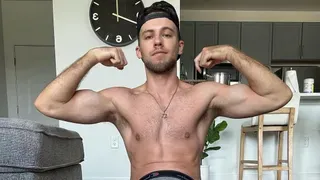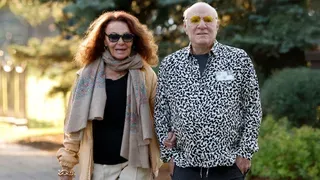March 15, 2011
Jay Kawarsky on 'Prayers for Bobby'
Kilian Melloy READ TIME: 12 MIN.
In Portland Oregon, on August 27, 1983, a 20-year-old gay man named Bobby Griffith jumped to his death from a freeway bridge. Bobby hailed from a town near San Francisco. His mother, Mary Griffith, had sought to "cure" him of his homosexuality.
As an account posted at the PFLAG website tells it, "The Griffiths attended Walnut Creek Presbyterian Church in Walnut Creek, California. There, Mary said, the ministers and the congregation were clear that homosexuals were sick, perverted, and condemned to eternal damnation. 'And when they said that,' Mary recalls, 'I said, "Amen." ' "
The PFLAG text adds, "The Christian counselor recommended prayer and suggested that Bobby spend more time with his father. But Bobby's diary revealed that nothing was changing. 'Why did you do this to me, God?' he wrote. 'Am I going to hell? I need your seal of approval. If I had that, I would be happy. Life is so cruel and unfair.' "
Bobby's diaries became an ongoing account of his torment, the PFLAG site's text indicates: " 'Gays are bad,' he wrote, 'and God sends bad people to Hell.... I guess I'm no good to anyone, not even God. Sometimes I feel like disappearing from the face of this earth.' "
Too late, Mary realized that Bobby was not suffering from an illness or any sort of pathology; his sexuality fell within the natural range of human sexual orientation.
Mary Griffith became an advocate for GLBT acceptance and equality. Her story was chronicled in the 1995 book Prayers for Bobby: A Mother's Coming to Terms with the Suicide of Her Gay Son by Leroy F. Aarons. The story of Mary and Bobby Griffith was destined to become both a cautionary tale and a moving, and uplifting, story about seeing beyond prejudice.
Composer Jay Kawarsky established the Delaware Valley Men's Chorus in 1991. The group was a gay men's chorus, but it wasn't until five years later that it came out, so to speak, and became the New Jersey Gay Men's Chorus.
At the time, being gay--or being associated with a gay group--was still something that people were often shy about. As Kawarsky explained in an interview, "It took some years, and I was actually one for putting the g-word in. OK, we'll lose some people, but we'll gain some people."
Kawarsky, who went on to found the Allentown, Pennsylvania-based Lehigh Valley Gay Men's Chorus in 1998, happened upon Aarons' account of Bobby's suicide and his mother's transformation. Together with lyricist Kendel Killpack, Kawarsky composed the musical score for a 40-minute choral work in four movements, also titled Prayers for Bobby. Kilpatrick's words come from Bobby's journals, and speak of his yearning for a lost childhood, a time when issues of sexuality did not torment him. The piece was premiered that same year by The Delaware Valley Men's Chorus. In 2009, Aarons' book became a TV movie on the Lifetime channel. The film starred Sigourney Weaver, whose role as Mary Griffith marked the first time Weaver had taken a part in a made-for-television film.
The Boston Gay Men's Chorus has responded to recent media attention to gay youth suicides by dedicating its Spring Concert to issues of struggle, alienation, and acceptance of young GLBT people. The concert includes a number of fun selections, but it is the heartfelt and ultimately uplifting Prayers for Bobby that serves as the program's core.
Jay Kawarsky is now a professor at Rider University in Princeton, New Jersey. He spoke with EDGE recently about the composition of Prayers for Bobby.
"It was the summer of 1995 when the book came out," as Kawarsky recalled it. "I happened to be in San Francisco, and I was just walking through the bookstore," Kawarsky continued. "I looked at the cover and saw the title, Prayers for Bobby. I thought, okay, something religious. I had hidden behind being Orthodox Jewish in college, without coming out. Just the name itself sounded interesting."
It was on the strength of the book's title that Kawarsky picked it up. "I did not know" the story of Mary and Bobby Griffith, Kawarsky told EDGE. "I am not one of the people who watches TV who would have seen Mary Griffith on morning talk shows. I just picked it up and literally read it overnight.
"I found the narrative, how Roy had done it, to be quite engaging," Kawarsky added. "I think the parallels that had happened in my life [drew me to the story]. It was just not something we spoke about, growing up, in the '60s and '70s... it wasn't like that in my family. We just didn't discuss these things, and myself and my other friends now, who had come out to each other in high school... or those who I knew from my high school graduating class who took their own lives..." Kawarsky's voice trailed off. "There were a lot of things that I hadn't learned at that age."
Kawarsky added, "As someone who deals with depression daily, I have been to the end of his rope. I did feel a connection with Bobby. Had he lived, how old would he be today?" Bobby would be 48. Noted Kawarsky, "He'd be three years younger than me; there's a connection there with age. Ken--[lyricist] Kendall Killpack--was his age."
Another connection: "It turns out the guy who wrote the book, Roy Aarons, is Jewish. He's now deceased. And his partner, who is much younger, grew up in a city in Israel where I used to teach."
The text used for the musical piece does not talk about Bobby and Mary's relationship as much as Bobby's ruminations on a secret identity as a gay man that he's unable to publicly embrace, and the pain that this causes him.
"The [Griffiths] gave Ken and myself the journals and the diaries to read," Kawarsky told EDGE. "The guy who wrote the libretto, Ken Killpack, he was someone from a strict Mormon family, and so he had [empathy for] the story also."
Kawarsky's musical rendition brought him into close contact with Bobby's family, especially his mother. "Having met her, getting permission was very weird," the composer recalled. "What happened was I was out there, I'd read the book--Mary came up from Walnut Creek, and I had flown back to meet them, and Ken had flown in from Denver. We met the two of them and told them what we wanted to do. Ken said that he would pass the material by Roy.
"I gathered that there were several stories that Ken had not filled me in on. Roy did not like certain things, but Roy had never written anything like this. He had been a newspaper editor. But it got done."
'The Golden Thread'
"Mary talked about it in terms of the 'golden thread,' " Kawarsky added, going on to explain, "She started writing letters to herself from Bobby. It was part of her therapy. These, we never saw, except one, and that one was the one she had written that is read in the course of narration--'Dear Mom and Dad and everyone,' where she talks about the golden thread, or he talks about 'the golden thread that will keep us connected for all time.'
"There's a line in the song, the lyrics build up to it, which is..." Kawarsky laughed. "The music Mary likes is country western, and I just couldn't work in country western and turn it into some ridiculous 'Mah heart is broken' song. So I worked in something else from that time, a Carpenters type song."
The Griffiths were never far from the piece's origins.
"Mary and her husband Bob did come to the first performance, where Marlo Thomas narrated, and then Roy and Mary both came to GALA that year," Kawarsky told EDGE, referring to the Gay and Lesbian Association of Choruses, which has a convention once every four years.
"And then Mary and Roy and Bob did come to a performances in San Jose, but since that time she has said, 'I can't keep re-living and re-living and re-living it.' [That was in] the late 1990s, [and] there have been a lot of performances, but she hasn't gone to [any of them]. She said, 'Jay, would you by my spokesman for it?' "
At a subsequent visit to the Griffiths' home, Kawarsky asked to see Bobby's grave. "Why would you want to see that?" Kawarsky recalled Mary Griffith asking him.
Kawarsky's reply: " 'Closure. I need to move on to something else.' And she said, 'To be honest with you, I don't know where it is,' " Kawarsky told EDGE. Her husband drove them to the young man's grave, which is located in the woods where Bobby used to ride his bike.
"She took some flowers up," Kawarsky recalled. "She said, 'Oh, one of Bobby's friends must have been here.' And she pulls [the flower holder] up [from the grave] and pulls out a necklace of freedom rings. It was pretty powerful.
The mid-1990s were a different time for GLBTs, Kawarsky reminded EDGE. "You have to put yourself in another time. GLSEN [the Gay, Lesbian, Straight Education Network, a national organization that works for safer schools for GLBT youth] was young. Very few people had heard of it, let along having any GSAs [Gay-Straight Alliances] in high schools."
In some ways, things have not changed so much. "At that time it was [the case that] one out of three teenage suicides was sexual orientation related. But we look at that today, in 2011, and that's still the number," Kawarsky noted. "And then what's happened right up the road from me, at Rutgers University..." Again, Kawarsky's voice trailed off. He was referring to an 18-year-old student, Tyler Clementi, who jumped from the George Washington Bridge last September after his roommate spied on him during an intimate encounter with another man using a webcam, and then reportedly blogged about it.
Addressing the theme of a "Halloween mask" that the lyrics refer to--a mask that covers over Bobby's true self--Kawarsky revealed that there was actually another level of meaning there. Halloween "was his favorite holiday, and it's still Mary's favorite holiday."
Those words serve as a thematic counterweight to dreams Bobby's journal entries recalled, in which the youth was flying free and unworried. "Those were [his] words--'Once I had dreams of flying,' " Kawarsky told EDGE, quoting from the second movement of the piece. "And when Ken emailed them to me, the tune was already there; part of that song, where he's talking about flying dreams, in between it goes into the 3/4 [meter] section," the composer pointed out.
"He talks about home movies. I remember home movies from when I was growing up--you remember the old home projectors and the squeaky little films that would go clack clack clack, clack clack clack, clack clack clack. I heard a 3/4 meter in there, and those are the in-between sections."
The first movement is a song called "Sissy," which, Kawarsky told EDGE, is intended to "feel like 1970s bubble gum pop. And his grandmother really did call him a sissy," Kawarsky added, just as the song describes. The lyrics also speak of other childhood experiences: asking for a Malibu Barbie, dressing up as a princess in his sister's half-slip.
"Now, the words in that song Ken took from the diaries and the journals," Kawarsky told EDGE. "He did wear his sister's half-slip. You know, these little things, going through his mother's jewelry box, putting on a camisole, the hello to the trees..." But the piece parallels those innocent moments from childhood with darker things from later on.
"Now, what you have to understand is, he was no saint," Kawarsky said. "He did go over to the other side of the bay--it takes all of ten minutes to get from Walnut Creek to San Francisco, and there were nights that he did not come home. He would go to the middle of the dance floor, in one of the pickup bars, and that's how he would get money."
Kawarsky related details to EDGE of Bobby's family life. "He was outed by is brother. They were cleaning the car, and he accidentally told his brother." Mary's response was to see the issue in the terms her religion had instructed her to: as a matter of sinful behavior. "They went to the church and the church said, 'If you pray hard enough it'll go away.' Right," Kawarsky said. "And Mary would talk in the book about how she thought they were getting closer and closer and closer [to Bobby being 'cured']. Well, what she didn't know what that her niece, up in Oregon, was also gay. And that's who he used to go visit."
It was while living with his cousin that Bobby killed himself, according to the account at the PFLAG website.
"And she'd tack up these little verses around the house," Kawarsky continued. "She got a box of cards, literally the 3 x 5 cards, of verses from the Bible, and one of the biggest ones was [the quote from Romans 6:23], 'The wages of sin is death." And she truly [believed this]."
After Bobby's suicide, Mary "went back to her church and she said she sat there in her pew "blind eyed," thinking he got what he deserved," Kawarsky related. " 'The wages of sin are death.' And she went to this minister afterwards and said, 'I need help. This just can't be right.' The minister said, 'I just don't think I can give you the answers you want.' And she found an MCC minister, and he said, 'My book can be read more than one way.' "
A Family's Healing Journey
"Mary is not a simple woman," Kawarsky continued. "She's a very complex woman. But having the simple theology that she had been given, she never had come to the idea that the Bible could be read more than one way. Now, I'm certainly from a religion that goes from, 'The bible was strictly handed down from God, and God wrote it himself with His own finger,' to, 'There are different movements about looking at the Bible in context of social history.' " Mary, Kawarsky said, "started reading theology books that [challenged her church's interpretation], and it brought her a long way."
Bobby's father is not a central figure in the story's different manifestations of book, song, and film. Kawarsky addressed him, telling EDGE, "Her husband, Robert, was never really part of this. I have left him out of this whole discussion, because he's a 'simple engineer,' as he would put it. He told Mary she could raise the family however she wanted, as long as religion didn't get in the way of keeping the family together.
"Well, there was a point when religion did almost destroy the family--which was not in the book," Kawarsky said. "Nor was it in the movie.
"Bob never really did deal with the death. He refused to read the journals and the diaries when they were found. Nor has he ever read the book," the composer related.
"Robert is a great guy," Kawarsky added. "After the first performance, which was at Trinity Cathedral in Trenton, there was a reception, and Mary was signing books, and Marlo Thomas was having her picture taken with people, and so on. I looked for Bob, and it turned out he was in the little Shakespeare garden off to the side. And he was weeping. It was explained to me that this was the first time Bob had ever dealt with his son's death, however many years later--this was 1996, and the suicide was August 27, 1983."
The score contains musical references to a number of hymns. Kawarsky explained this, telling EDGE, "They're favorite hymns of Mary's. They are part of the underscoring for the narrator." The nod to Mary's faith is fitting, Kawarsky said. "A very close friend at the time got very, very angry at me, because he knew someone who had committed suicide who was gay, and as far as he was concerned, [Bobby's death] was all his mother's fault. I told him, 'You have it all wrong. The story is not about Bobby's suicide. This story is about a woman taking a journey.' "
In the course of preparing the piece for the Spring Concert, Boston Gay Men's Chorus musical director Reuben Reynolds III has not sought Kawarsky's guidance, which Kawarsky told EDGE "is fine by me. As a conductor, you've got to make the material your own. Someone has to have the vision of how this piece will work at this time, how it will fit into a program. That has to be Reuben."
The driving mission of the Boston Gay Men's Chorus is to work toward a more just society in which greater acceptance of GLBT people is a hallmark. Kawarsky suggested that Payers for Bobby fits into that over-arcing purpose.
"One thing that people ask me is, 'Is this piece preaching to the choir?' " Kawarsky said. "Well, if your audience is only the gay and lesbian community, then maybe, but if one person comes... You know, there's a belief in Judaism that if you save one person's life, then it's as if you have saved the entire universe. This is not preaching to the choir, because all of us are singing this piece, telling the story. We are reaching out to someone who needs to stay alive."
Clearly, Prayers for Bobby has affected many lives, some of them profoundly. "Every time the piece has been performed and I've been there, people have come up with their own stories," Kawarsky said, going on to relate one concert in Tucson, Arizona, that he attended. "This guy had left his family in Indiana some years before when he was in his teens. He had run away. He was in his twenties now, and his family had found him. They had seen in the paper that the men's chorus down there was going to perform this, and they knew their son was living in the area. They found their son, and they all came to the performance. I met them," Kawarsky said. "It was really quite amazing."
Kilian Melloy is a singer and board member with the Boston Gay Men's Chorus. The BGMC's Spring Concert, "True Colors," will take place Saturday, March 26, and Sunday, March 27, at 8:00 p.m. both nights, at the New England Conservatory's Jordan Hall.
Kilian Melloy serves as EDGE Media Network's Associate Arts Editor and Staff Contributor. His professional memberships include the National Lesbian & Gay Journalists Association, the Boston Online Film Critics Association, The Gay and Lesbian Entertainment Critics Association, and the Boston Theater Critics Association's Elliot Norton Awards Committee.






